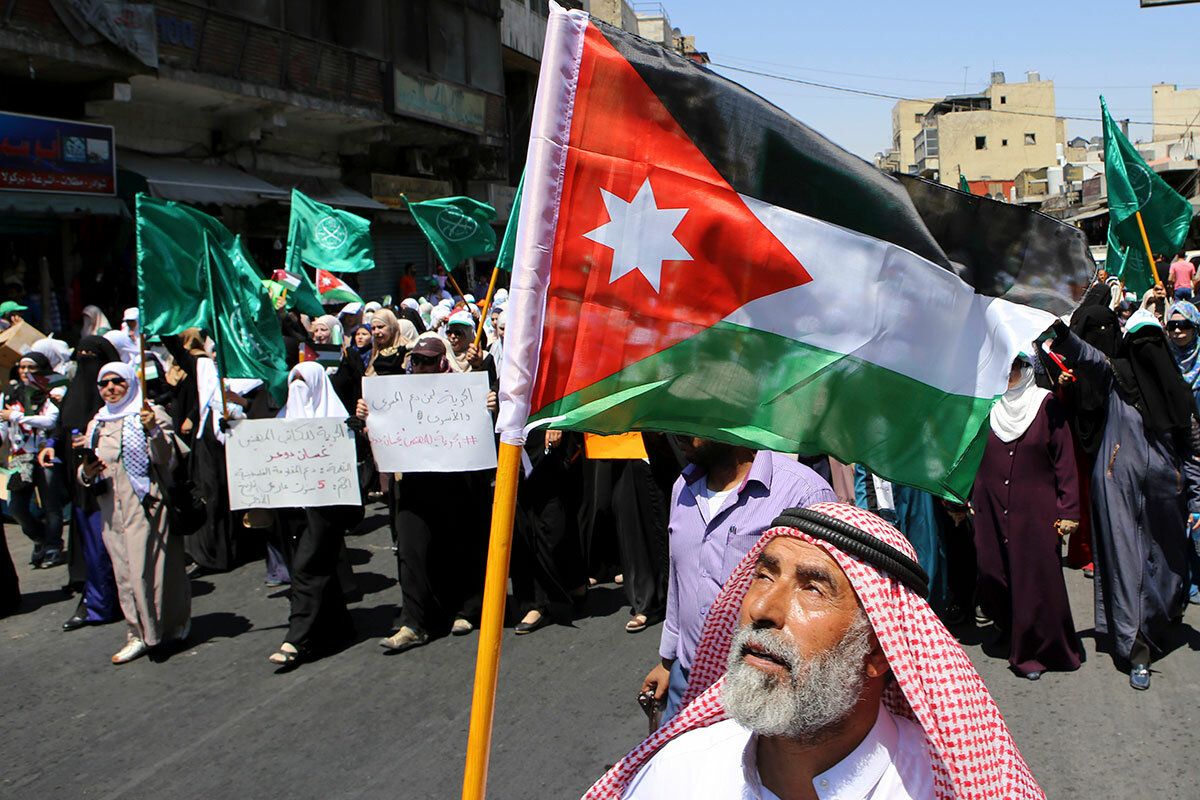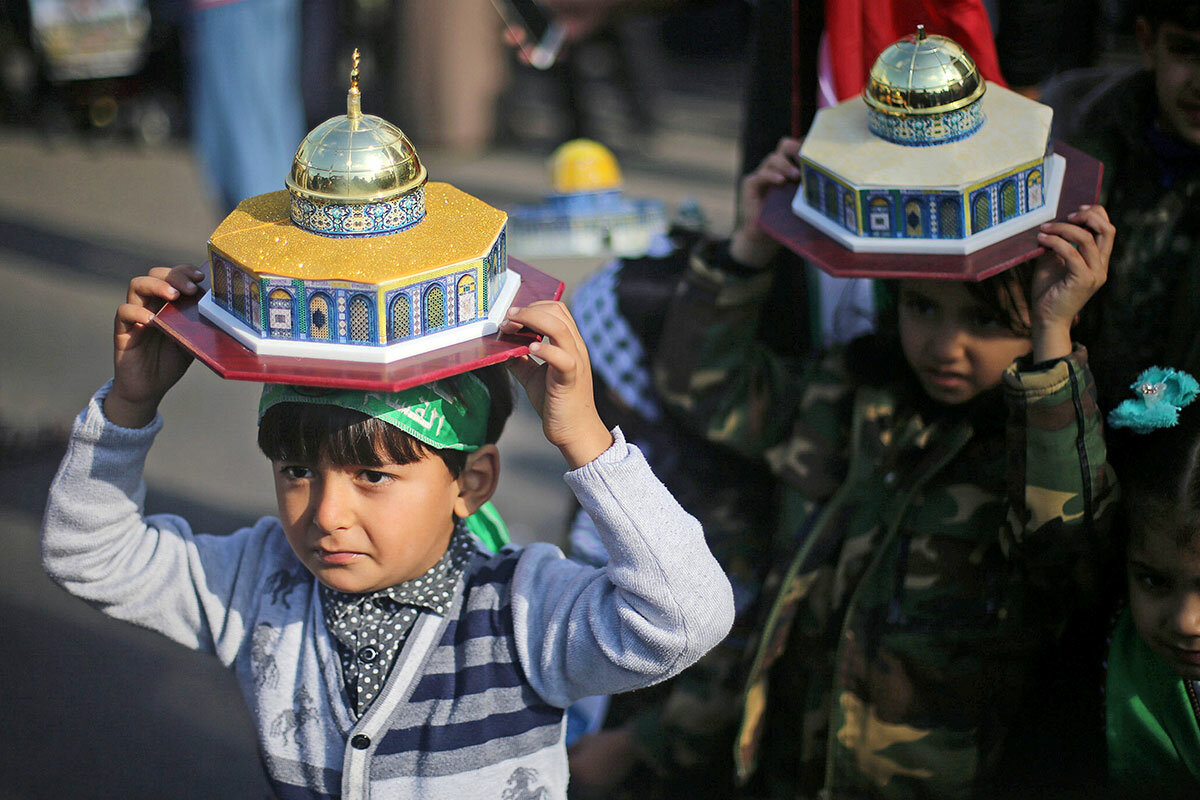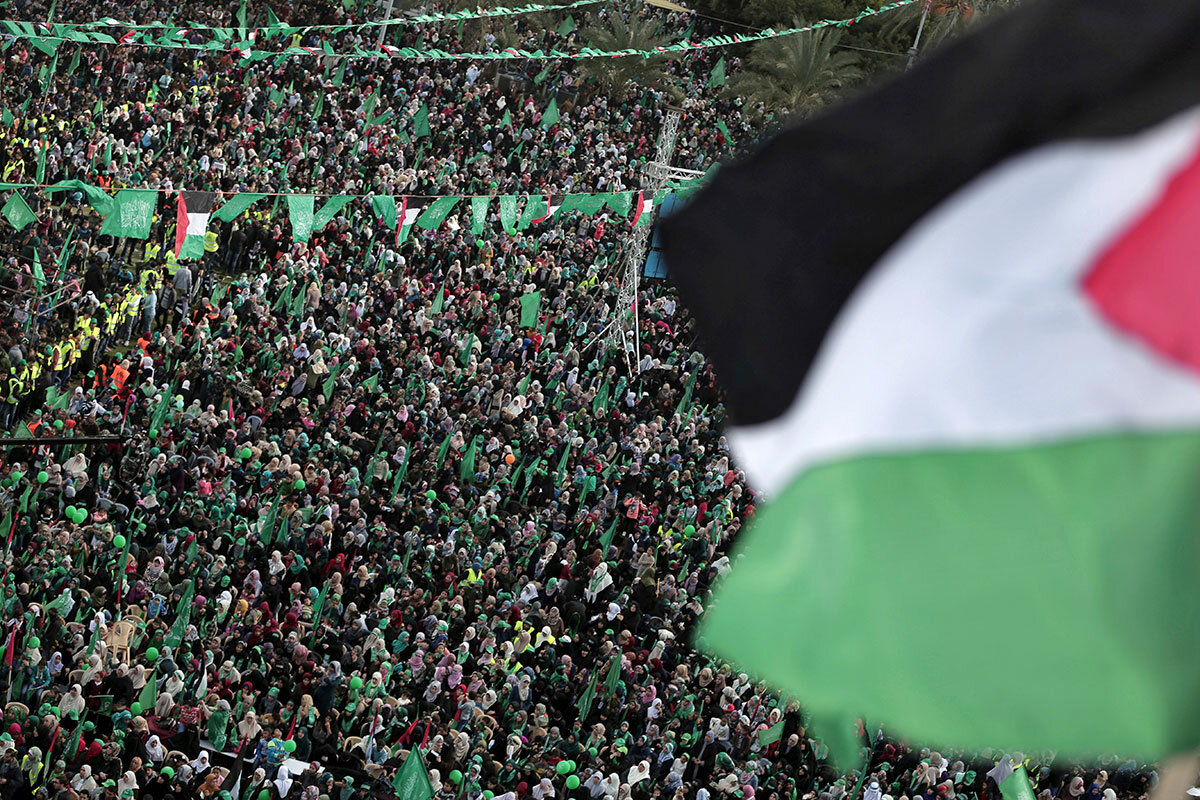How Trump move on Jerusalem throws a lifeline to Muslim Brotherhood
Loading...
| Amman, Jordan
President Trump’s declaration recognizing Jerusalem as Israel’s capital has elicited criticism and outright condemnation from world leaders ranging from traditional US allies to long-time adversaries.
In the Arab world, scene of multiple demonstrations since Mr. Trump’s declaration, the reaction has been especially angry and has created one clear political winner: the conservative Muslim Brotherhood.
The Islamist organization – violently suppressed in Egypt, outlawed in much of the Gulf and marginalized elsewhere in the region – has stood against the Arab-Israeli peace process and negotiations over Jerusalem for decades.
Analysts and politicians say the Brotherhood’s strong language and decisive action have filled a void left by Arab regimes that have condemned the declaration but are cautious not to strain ties with the US and Israel.
The movement, which has witnessed a stunning rise and rapid fall since the Arab Spring, has been given a new lease on life as it attempts to rebuild its credibility with the Arab street. It is now setting its sights on a return to the political scene as it leads popular protests in multiple Arab states.
In Jordan, where the Brotherhood has been largely absent from the streets for three years, the movement spearheaded nationwide protests against the US and Israel, organizing the largest protest Jordan has seen in nearly a decade.
In Kuwait, the Brotherhood’s Islamic Constitutional Movement led protests against the Trump declaration, with the group’s members of parliament even calling on the Kuwaiti leadership to reconsider its relationship and investments in the US if Washington refuses to retract the decision.
Brotherhood-aligned clerics in Libya, Qatar, and elsewhere have also denounced the US and Israel and have urged popular action.
Search for a message
After calling for freedoms and democratic reforms during the Arab Spring in Egypt, Libya, Syria, Jordan, and elsewhere, the Brotherhood recently has struggled to come up with a message to appeal to Arabs sick of revolutions, instability, wars, and extremism.
After five years of being attacked by secularists, leftists, minorities, and regime loyalists, the Brotherhood suddenly seems to be getting support from all segments of society.
“The Arab Spring exposed our differences: when we demanded reforms and freedom, other groups and people disagreed with our priorities and approach,” says Saud Abu Mahfouz, an MP from the Brotherhood’s Islamic Action Front party in Jordan.
“On the issue of Jerusalem, there are no two Jordanians who disagree, no two Arabs who disagree, no two Muslims who disagree.”
According to Shadi Hamid, a senior fellow at the Brookings Institution in Washington and co-editor of “Rethinking Political Islam,” “The Brotherhood has been on its back foot for some time and has struggled to adapt to the post-Arab Spring environment and find a political high ground where it is difficult for people to take issue with them.”
Jerusalem, he says, “is one of those issues.”
Religious claims
While the Brotherhood’s stances have evolved over time, such as accepting a civil state, the role of the Quran as a source of law, and women’s and minorities’ rights, its language and position on Jerusalem have remained largely unchanged for decades.
Since the Brotherhood’s founding in Egypt in 1923, Jerusalem and the Palestinian cause have been at the core of its appeal, rooted both in its ideology and Islamic claims to the holy city.
Muslims originally prayed facing Jerusalem, where tradition holds that Muhammad ascended to heaven. Jerusalem’s Old City is also the location of the Al Aqsa Mosque, the third-holiest site in Islam. The holy city is the burial site of thousands of prophets and companions to Muhammad, and the city plays an important part in the end-of-days beliefs of Muslims.
Jerusalem, say Brotherhood members and supporters, is a symbol more important than Mecca.
Hassan al-Banna, the founder of the Brotherhood, sent fighters to Jerusalem to aid the Arab uprising in British-mandate Palestine in 1936, and established several branches across Palestine in the 1940s.
Opposition to Oslo
During the first intifada in 1987, the Brotherhood’s Egyptian branch formed the militant Palestinian movement Hamas with the intent of “liberating” all of Israel and establishing an Islamic Palestinian state in the West Bank, Gaza, and Israel.
The Oslo peace accords between Israel and Yasser Arafat’s Palestine Liberation Organization in 1993 gave a new mission to Brotherhood branches across the Arab world, particularly in the occupied Palestinian territories and in neighboring Jordan.
The Brotherhood stood against the peace process and any Arab normalization with Israel. Its branches in Jordan and Egypt opposed the two countries’ treaties with Israel, and used the talks’ failure to end the Arab-Israeli conflict as a wedge to drive between Arab regimes beholden to the US on the one hand, and their publics who were wary of the peace process on the other.
The movement’s disciplined messaging on Palestine has been noticed by the younger generation, many of whom had not yet come of age when the Arab Spring erupted six years ago.
“I am not political, I am not part of a party, and I have no ideology,” says 17-year-old Osama Bashnaq, who was protesting for the first time in a Brotherhood-led protest in downtown Amman on Dec. 8.
“But the Brotherhood have been the strongest standing by Jerusalem. They deserve our support.”
Boost for Hamas
Perhaps no Brotherhood branch has seen a turnaround in fortunes like Hamas. Recently, cracks were showing in the group’s hold on an increasingly marginalized and economically depressed Gaza Strip; in January, thousands of Gazans protested against Hamas’s administration and ongoing electricity cuts.
As recently as September, in a head-to-head matchup for president, 50 percent of Palestinians polled said they would choose the embattled and deeply unpopular Palestinian Authority President Mahmoud Abbas over Hamas’s Ismail Haniyeh, who was backed by 42 percent of respondents, according to the Palestinian Center for Policy and Survey Research (PCPSR).
In the wake of the Trump move on Jerusalem, Palestinian voters shifted, saying they would prefer Mr. Haniyeh over Mr. Abbas by a 53 percent to 41 percent margin, according to a PCPSR survey taken days after the declaration.
The same poll saw that the percentage of Palestinians calling for armed resistance – long advocated by Hamas – has risen from 35 to 44 since the declaration.
“I think Hamas benefits from being able to say that they were the ones who were right to be opposed to the peace process. They can point to this announcement as the evidence of the failure of the peace process or that the peace process never existed in the first place,” says Mr. Hamid at Brookings.
Next steps
Yet Islamists stress that they are not using the issue to undermine or even oppose Arab regimes.
“We are only strengthening the official Jordanian response, Arab response, and Islamic response,” says Zaki Bani Irsheid, who masterminded the movement’s 2016 electoral campaign in Jordan.
“We are not replacing it or dictating it.”
Yet if the US does not rescind its decision, the Brotherhood in Jordan is ready to push further. Its 14 MPs in Jordan have led an effort to debate the kingdom’s 1994 peace treaty with Israel, a motion that was passed unanimously. The Islamist bloc is demanding Jordan close the Israeli Embassy in Amman and aid all “resistance movements,” including Hamas, Islamic Jihad, and Al Aqsa Brigades. Brotherhood leaders say privately they want Jordan to reopen Hamas’s offices in Amman and downgrade ties with the US.
Expecting dramatic action in the near future is “unrealistic,” the leaders say, but there’s a chance of shifting the narrative for future generations.
“The next generation will be the ones to realize the will of the Islamic and Arab nation,” says Mr. Abu Mahfouz, the Jordanian MP. “And we are patient.”










